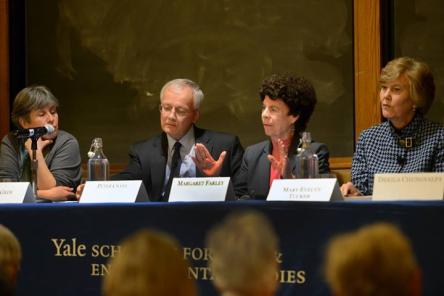Amid the intense dynamics about climate change—the science, ethics, economics, and politics—hope has seemed in short supply, to the detriment of the world’s ability to respond to the crisis.
 That, among other reasons, is why this summer’s environmental encyclical from Pope Francis promises to have a transformative effect on climate change dynamics, extending well beyond the worldwide Catholic Church, according to several panelists speaking at Yale on April 8 at an event titled “Pope Francis and the Environment: Why His New Climate Encyclical Matters.”
That, among other reasons, is why this summer’s environmental encyclical from Pope Francis promises to have a transformative effect on climate change dynamics, extending well beyond the worldwide Catholic Church, according to several panelists speaking at Yale on April 8 at an event titled “Pope Francis and the Environment: Why His New Climate Encyclical Matters.”
The event was a joint undertaking of Yale Divinity School and the Yale School of Forestry & Environmental Studies (F&ES). Video of the panel is available here.
“The science is here,” said Mary Evelyn Tucker, co-director of the Yale Forum on Religion and Ecology. Now, with Pope Francis adding his enormously influential voice, “the moral moment is also here,” she declared.
Tucker’s comment echoed opening remarks by Teresa Berger, professor of Catholic Theology at the Divinity School. The Pope’s encyclical, she predicted, will include “a gesture of hope, which I think we all need given the depth of the ecological crisis.”
Also speaking at the Yale panel were John Grim, co-director of the Forum; Peter Crane, Dean of F&ES; Margaret Farley, emeritus professor at the Divinity School; Dekila Chungyalpa, McCluskey Visiting Fellow at F&ES; and Douglas Kysar, professor at Yale Law School. Divinity School Dean Gregory E. Sterling gave concluding remarks.
Several panelists noted the auspicious timing of the Pope’s encyclical, or teaching document, as the global community heads toward crucial climate negotiations beginning in late November at the 2015 U.N. Climate Change Conference. Francis is also addressing the U.S. Congress in September as part of his visit to the United States.
Crane described the encyclical as having the potential to transform the bitter and stalemated partisan divides that have marked climate change politics in the U.S., in particular. Whether and how the encyclical will catalyze action to address climate change is unknown, Crane said—but it will have a significant effect. “The encyclical will be an end run around the paralysis,” Crane said. “It will certainly create a new dynamic.”